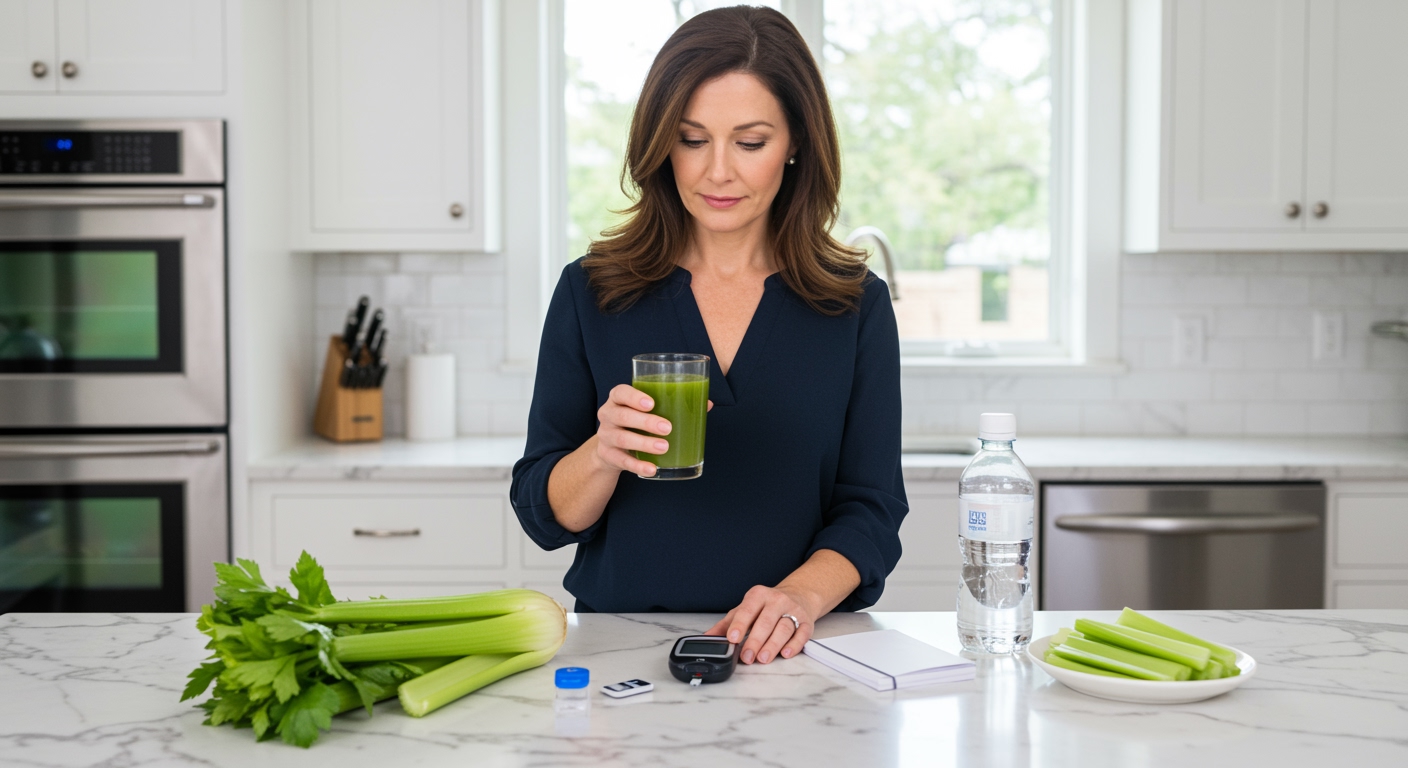✪ Key Takeaway: Celery juice may help diabetes through fiber and antioxidants, but it can also spike blood sugar due to natural sugars.
Introduction
Social media influencers claim celery juice cures everything from inflammation to diabetes.
You probably wonder if this green drink can actually help manage your blood sugar levels or if it is just another health fad.
Hi, I am Abdur, your nutrition coach and today I am going to explain exactly how celery juice affects diabetes and whether it deserves a place in your daily routine.
What Happens When You Drink Celery Juice?
Your body processes celery juice differently than whole celery stalks.
When you juice celery, you remove most of the fiber that normally slows down sugar absorption.
This means the natural sugars in celery enter your bloodstream much faster than they would from eating whole celery.
One cup of celery juice contains about 5 grams of natural sugars, mainly glucose and fructose.
These sugars can cause a blood glucose spike within 15-30 minutes of drinking the juice.
Your pancreas responds by releasing insulin to help cells absorb this glucose from your bloodstream.
✪ Fact: Celery juice has a glycemic index of approximately 35, which is considered low to moderate.
Does Celery Juice Lower Blood Sugar?
Celery contains compounds called flavonoids that may help improve insulin sensitivity.
These plant chemicals, particularly apigenin and luteolin, have shown promise in laboratory studies for supporting glucose metabolism.
However, the concentration of these beneficial compounds in celery juice is relatively low compared to other vegetables.
Research shows that celery extract may help reduce inflammation in the body, which is linked to better insulin function.
But drinking celery juice alone will not dramatically lower your blood sugar levels.
The immediate effect of celery juice is actually a temporary increase in blood glucose due to its natural sugar content.
✪ Pro Tip: Test your blood sugar before and after drinking celery juice to see your individual response.
How Much Celery Juice Is Safe For Diabetics?
Most diabetes experts recommend limiting celery juice to 4-6 ounces per day if you choose to drink it.
This amount provides some potential benefits while minimizing the blood sugar impact.
Drinking celery juice on an empty stomach can cause a more dramatic glucose spike than having it with a meal.
The best approach is to consume celery juice alongside protein or healthy fats to slow sugar absorption.
You should also consider the timing of your celery juice consumption in relation to your diabetes medications.
Some people experience digestive upset from drinking large amounts of celery juice, which can indirectly affect blood sugar control.
✪ Note: Always consult your healthcare provider before adding celery juice to your diabetes management plan.
Should You Choose Whole Celery Instead?
Eating whole celery provides fiber that helps stabilize blood sugar levels.
The fiber in whole celery slows down the absorption of natural sugars and helps you feel full longer.
Two stalks of celery contain only about 1 gram of sugar compared to 5 grams in a cup of celery juice.
Whole celery also requires more energy to digest, which can help with weight management.
The chewing action of eating celery stimulates saliva production, which contains enzymes that begin the digestion process.
For diabetes management, whole celery is generally a better choice than celery juice because it provides more benefits with less blood sugar impact.
✪ Pro Tip: Pair celery sticks with almond butter for a diabetes-friendly snack that stabilizes blood sugar.
The Bottom Line
Celery juice is not a miracle cure for diabetes, but it can be part of a balanced approach to blood sugar management when consumed in moderation.
The best nutrition advice is the one you can actually follow consistently, not the one that promises impossible results.
I would love to hear about your experience with celery juice or any questions you have about managing diabetes through nutrition in the comments below.
References
At NutritionCrown, we use quality and credible sources to ensure our content is accurate and trustworthy. Below are the sources referenced in creating this article:
- PMC: Celery and Blood Sugar Research
- PubMed: Flavonoids and Glucose Metabolism
- Ultrahuman: Celery Juice and Glucose Spikes
- Healthline: Celery Juice Nutrition Facts





